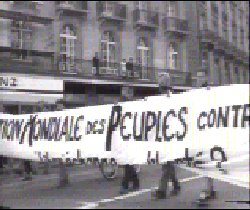 Saturday: the 16th of May found Geneva in a state of “soft siege” for the WTO Summit. 1600 police, plus customs, army infrastructure, helicopters braced against invasion by the foreign hordes of PGA! Finally, not many arrived, the French marchers of “Action contre le Chômage” having been (coincidence?) repressed by the police before they even started, and practically all the Italians and Germans arrested and expulsed by the Swiss Police. Only the Swiss part of the fantastic bicycle and tractor caravan – looking like a kind of beautiful gypsy circus – swept in, just as 10.000 people gathered for the largest demonstration that the United Nations has seen since the Reagan–Gorbatchev Summit in 1984. The people came with the banners of all kinds of struggles against some aspect of globalization: local unions fighting privatizations or austerity, groups of solidarity with the south, squatters, plus many personal banners, musicians, and the caravan tractors towing a huge sound system. Everyone there agreed: stupendous, unbelievable demo. In front, holding the PGA banner (with a four meter high banner from India behind them) were some members of the international Convenor's Committee and some other representatives of peoples' movements that participated in the First PGA conference: Prof. Nanjundaswamy, KRRS (India); Joon Kyu Kim, KFL (South Korea); Patricia Teran Vega, FZLN (Mexico); Fatima Orozco, UNAG and Daniel Querol, GME (Nicaragua); Rafael Alegria, Via Campesina (Honduras); Virgina Hernandez, COMUTRAS (El Salvador); Libia Grueso, PCN (Colombia); Gilberto Oliveira, MST (Brazil); Alejandro Demichelis, CTERA (Argentina); Paulo Cuinica, ORAM (Mozambique); Olga Samborska, CENTAVRIYA (Ukraine) and different representatives of European movements.
Saturday: the 16th of May found Geneva in a state of “soft siege” for the WTO Summit. 1600 police, plus customs, army infrastructure, helicopters braced against invasion by the foreign hordes of PGA! Finally, not many arrived, the French marchers of “Action contre le Chômage” having been (coincidence?) repressed by the police before they even started, and practically all the Italians and Germans arrested and expulsed by the Swiss Police. Only the Swiss part of the fantastic bicycle and tractor caravan – looking like a kind of beautiful gypsy circus – swept in, just as 10.000 people gathered for the largest demonstration that the United Nations has seen since the Reagan–Gorbatchev Summit in 1984. The people came with the banners of all kinds of struggles against some aspect of globalization: local unions fighting privatizations or austerity, groups of solidarity with the south, squatters, plus many personal banners, musicians, and the caravan tractors towing a huge sound system. Everyone there agreed: stupendous, unbelievable demo. In front, holding the PGA banner (with a four meter high banner from India behind them) were some members of the international Convenor's Committee and some other representatives of peoples' movements that participated in the First PGA conference: Prof. Nanjundaswamy, KRRS (India); Joon Kyu Kim, KFL (South Korea); Patricia Teran Vega, FZLN (Mexico); Fatima Orozco, UNAG and Daniel Querol, GME (Nicaragua); Rafael Alegria, Via Campesina (Honduras); Virgina Hernandez, COMUTRAS (El Salvador); Libia Grueso, PCN (Colombia); Gilberto Oliveira, MST (Brazil); Alejandro Demichelis, CTERA (Argentina); Paulo Cuinica, ORAM (Mozambique); Olga Samborska, CENTAVRIYA (Ukraine) and different representatives of European movements.
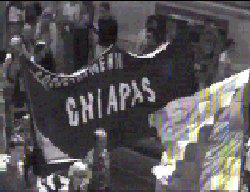 The demo moved like a tide of hope through the city. The banks and a couple of McDonalds deserved special treatment by some demonstrators, who painted and broke their windows. 100 meters from the WTO Building (fittingly decorated with steel barriers, rolls of barbed wire and Police) the demo halted, and there were some moments of tension when a few objects were thrown at the police. But the tension disappeared as soon as the representatives of peoples' movements spoke: of the hundreds of thousands of Indian farmers fighting against the WTO and the hundreds of them driven to suicide by its policies; of the defiant Zapatistas and the dirty war waged against them by the Mexican government; of the impact of neoliberal policies on education, and much more. Then the demo moved back to a crossing and a street party started – complemented with a huge dinner cooked and shared in the park next to the crossing. On the way back to the crossing a diplomatic Mercedes of the WTO was overturned, which happened to be Ruggiero's car (the head of WTO!!). At around 22h30 the demo came back to the city centre and was officially ended. However the sound system was still playing and many people were still assembled. Suddenly a small group started breaking all the windows in sight and the police charged. The remains of the demo retreated towards the park where the caravan was camping. Most of the demonstrators gathered around a fire and tried to calm things, but a small group (many very young kids from the quarter) continued breaking small shops and affronting the police. Many people got beaten up (especially the people from the caravan, who were not taking part in the fights) – several were seriously injured, at least one ending up in intensive care at the hospital. The police charged with teargas against the camp (where there were families with small children sleeping) and provoked its dissolution in the middle of the night. The fighting went on until 4h30 in the morning as the police helicopter and searchlight attracted hundreds of the Saturday night crowd to join the show.
The demo moved like a tide of hope through the city. The banks and a couple of McDonalds deserved special treatment by some demonstrators, who painted and broke their windows. 100 meters from the WTO Building (fittingly decorated with steel barriers, rolls of barbed wire and Police) the demo halted, and there were some moments of tension when a few objects were thrown at the police. But the tension disappeared as soon as the representatives of peoples' movements spoke: of the hundreds of thousands of Indian farmers fighting against the WTO and the hundreds of them driven to suicide by its policies; of the defiant Zapatistas and the dirty war waged against them by the Mexican government; of the impact of neoliberal policies on education, and much more. Then the demo moved back to a crossing and a street party started – complemented with a huge dinner cooked and shared in the park next to the crossing. On the way back to the crossing a diplomatic Mercedes of the WTO was overturned, which happened to be Ruggiero's car (the head of WTO!!). At around 22h30 the demo came back to the city centre and was officially ended. However the sound system was still playing and many people were still assembled. Suddenly a small group started breaking all the windows in sight and the police charged. The remains of the demo retreated towards the park where the caravan was camping. Most of the demonstrators gathered around a fire and tried to calm things, but a small group (many very young kids from the quarter) continued breaking small shops and affronting the police. Many people got beaten up (especially the people from the caravan, who were not taking part in the fights) – several were seriously injured, at least one ending up in intensive care at the hospital. The police charged with teargas against the camp (where there were families with small children sleeping) and provoked its dissolution in the middle of the night. The fighting went on until 4h30 in the morning as the police helicopter and searchlight attracted hundreds of the Saturday night crowd to join the show.
Sunday: the minister of “justice” and the yellow press (which had been advertising “riots during WTO conference” for months!) said the PGA was responsible for the riots. The convenors replied that they regretted the damage to small shops but that this violence was nothing compared to the violence organized in the WTO building. Unfortunately, the very necessary internal discussions provoked by this situation resulted in rather small numbers attending the seminar on WTO held at the University.
Monday: police repression continued. Young people were arrested at random in the streets (more than 350 in four days), chained for hours to pillars in an underground parking lot, illegally fingerprinted and often beaten, imprisoned on vague charges or expulsed from the country for years. Despite all this, actions continued, demonstrating in front of Clinton's hotel, blocking traffic at intersections and occupying symbols of globalization in the city, such as the international headquarters of the World's biggest arms dealer (and corrupter of governments) Lockheed Aviation. The activists presented to the press documentary evidence stolen from Lockheed's office of its dubious dealings with politicians and NATO generals. The headquarters of United Bank of Switzerland (which recently merged to make a hundred billion dollar increase in profits and throw out 10.000 employees) was also occupied ... and filled with feathers!
Tuesday: repression and actions continued. At 18h more than a thousand persons, gagged and handbound (to symbolize the situation of the people with respect to the global decision makers) marched in silence from the station to the Island of Rousseau (author of “The Social Contract”) in the middle of the city to denounce the replacement of social policy by market forces. A symbolic burial was performed in front of his statue representing the victims of economic warfare, humans treated as merchandise. In the night, the riots broke out again (this time definitely detached from any PGA event) and lasted until the early hours. The police took the excuse to surround and illegally break into Artamis – a centre of alternative activities and artisans where the caravan had sought refuge. All sixty people on the site were brutally arrested. Some of the caravan participants were arrested three times in the week, each time for many hours without food or water.
Wednesday: PGA called for a action of non-violent civil disobedience at midday in front of the United Nations (where the WTO conference was taking place), with the stated intention of crossing the police barriers, entering and stopping the conference. After an open-air press conference with the convenors and a public announcement to the police of the non-violent nature of the action, several hundred people moved calmly and determinedly forward, some even on their knees to emphasize the non-violence. Police responded with incredible violence, kicking and bludgeoning under the TV cameras for more than an hour. 9 people were arrested and most of them severely beaten when handcuffed and in custody. The police told one that they would break his fingers, and then did so. Another had his nose deliberately broken. The demonstrators refused to leave if their friends were not released. Finally 8 people were freed.
Saturday 22: demonstrators gathered outside the prison, on the outskirts of the city, to cheer their friends inside. By Monday the authorities, under a certain pressure from some of the media, had released all, but almost a hundred are indicted and many foreigners are banned. An anti-repression committee has organized a demo since and obtained the formation of a parliamentary inquiry on the issue.
Evaluation: we are happy!!! Despite many errors and lack of organization, the incredible response of all kinds of people in Geneva and all Switzerland has at one stroke transformed the WTO from an unknown acronym to a very controversial institution with a very bad public image, at least in this country. Ruggiero was always on the defensive, since all kinds of NGOs, parties, and unions suddenly have started to criticize the WTO. Despite the riots, popular support for the PGA in Geneva is untouched and massive. Many people needed this. Since '68 there hasn't been a movement that has grown so fast and beautifully. The success in Switzerland has many people asking, “is this the first flutter of a new global social movement?” After so many years of saying “it's no use resisting here, we would have to organize globally”, people are thinking “hey, maybe we can!”
Next steps for us: an international seminar in August, mobilizations against the MAI in October, and against Davos (internationally?) in January. This was just the beginning!
Report of the bicycle caravan “Money or Life?”
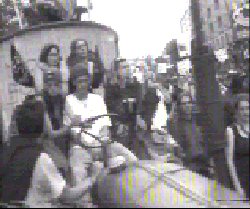 A group of cyclists and two tractors went all the way from the North, East and centre of Germany to Geneva. The caravan stopped in many different towns, where local hosts organized talks, video shows, demonstrations, etc. They also prepared information billboards about local struggles, to be added to an exhibition that grew and grew on the way to Geneva. The caravan left from three different places: Gorleben, Dresden and Mainz. This report is based on the notes taken by someone who participated in the first one. Hence, there is no report about the cities that were visited by the caravans from Dresden and Mainz before they met the Gorleben caravan.
A group of cyclists and two tractors went all the way from the North, East and centre of Germany to Geneva. The caravan stopped in many different towns, where local hosts organized talks, video shows, demonstrations, etc. They also prepared information billboards about local struggles, to be added to an exhibition that grew and grew on the way to Geneva. The caravan left from three different places: Gorleben, Dresden and Mainz. This report is based on the notes taken by someone who participated in the first one. Hence, there is no report about the cities that were visited by the caravans from Dresden and Mainz before they met the Gorleben caravan.
The caravan left Gorleben, a region in the North of Germany where there is a very strong local resistance against a radioactive waste cemetery. There were only five people cycling at the beginning, along with a tractor, but many more people and one more tractor joined them on the way. In Hildesheim there was a little march trough the city and a meeting and discussion about the MAI, followed by a party. In Göttingen there was again a march in the city centre, which finished with a concentration at the main square. In Gunkelrode, an idyllic small village, the caravans from Gorleben and Dresden met. There were many visitors from the surrounding areas. This was followed by the longest trip, more than 100 km in one day, accompanied with a storm, at the end of which the caravan arrived to Saasen. They got to Frankfurt the next day at about 14:00, where they entered along with the police. As they entered in the city, they were met by a very warm welcome, which was followed by a demonstration through the city centre with theatre, music and good speakers. After the demonstration they went to Bockenheim, where there was a concert in the evening. The next day the caravan and a group of locals went to a forest that will be destroyed by an expansion of the Frankfurt airport (which is already one of the biggest in the world), where they were met by the police. Finally, the support of locals convinced the police to let them in the forest, where they placed an information stand, and there were speeches about the caravan, the airport expansion, the increasing role of air traffic in trade and the globalization process, etc.
The next station was Darmstadt, where there was a demonstration at the city centre. An oil extracting tower was installed in the pedestrian area, which was used as stage for a street theatre play about the MAI. Later, at dinner, some videos about Chiapas and Gorleben were shown. On the way to Heidelberg the caravan was stopped for a long time by the police. Once in the city, there was a concentration in the centre. In Karlsruhe there was a party in a square that was “cleaned” of homeless people by the municipality. The homeless could return to the square to participate in the party, together with people from all walks of life. There was also a video session about displacement of people. That evening there was a very successful meeting about the MAI, at which the discussions lasted until deep in the night.
The next day the police “joined” the caravan most of the day, and stopped it from approaching a military airport, at which a press conference was supposed to take place, forcing it out of its itinerary. However, the journalists that went to the military base were brought to a lake where the caravan was having a rest, and the press conference could take place. In Freiburg there was a day-long party with information about Gentech in Biovalley (i.e. the concentration of Gentech in the area Strasbourg – Freiburg – Basel), and about homeless people living in roulettes and being kicked out by the municipality. A street was blocked to build up a living room, in order to draw attention to the problem of homelessness. The next day there was more music and information sessions in the city centre.
The next day the Swiss border had to be crossed, which had been a reason for concern for a long time. In order to make the crossing of the border easier, the local group from Basel built up a professional press agency called “synergo media”, in order to get as many journalists to the border as possible for the time the caravan crossed it. The strategy was successful: the amount of photographers and TV cameras that went to meet the caravan (along with many people from different Swiss cities) helped to pass the border controls without incidents. Once in Basel, a group of people climbed on the roof of Novartis (the merge of Ciba Geigy and Sandoz, once of the strongest TNCs in the world, specializing on Biotech) to represent a sketch about genetic engineering, after which there was a march through the street.
The next stop was Aarau. The caravan was stopped by the police from entering the city, the reason being that the park where they wanted to sleep was too small for them, but finally the caravan was allowed in the city and camped in the park, where videos were shown. The next day there was a stop at the nuclear power plant of Gösgen, where the streets were painted in a small protest. The same day the headquarters of a mining TNC was visited at Oftringen.
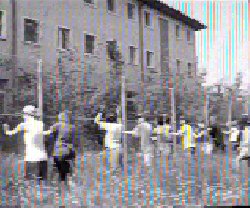 On the way to Bern there was another stop at the women's prison of Hindelbank, where there is a majority of foreign women. There was an action to express solidarity with them, with music and a text in several languages. Then some people shook the prison's wire fence, which was slightly damaged since it was of very low quality. The reaction of the police was quick: several police vans rapidly turned up, but they did not arrest anyone. In Bern there was a bike demonstration in the city centre, followed by a party.
On the way to Bern there was another stop at the women's prison of Hindelbank, where there is a majority of foreign women. There was an action to express solidarity with them, with music and a text in several languages. Then some people shook the prison's wire fence, which was slightly damaged since it was of very low quality. The reaction of the police was quick: several police vans rapidly turned up, but they did not arrest anyone. In Bern there was a bike demonstration in the city centre, followed by a party.
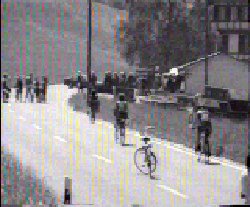 The next day, on the way to Fribourg, a lot of police vans appeared on the road and stopped the caravan. The policemen came out with riot gear, and with equipment for tear gas and rubber-bullet guns. All the bike riders were taken to a place that had been previously prepared by the police, where they took pictures and personal data from everyone. The reason for the detention was “rupture of the peace” and “qualified destruction” of the fence at the women's prison the previous day – which according to them led to several tens of thousand Swiss Francs of damage. The arrested asked what kind of “qualification” was there on a bit of bent fence and why the wire was so expensive, but noone could explain it to them. The police also ignored the requests for medicines, food and covers (the room was rather cold). After a long time, all people were put in vans (separating Swiss from non-Swiss) and brought back to the place where their belongings had been left with some policemen to look after them. There they found out that all their luggage had been registered and several things were missing (e.g. a portable computer), but there was neither an explanation from the police nor a list of the things that had been taken away. The police then drove the non-Swiss to the French border and expelled them from the country. As they tried to get in again, they were informed that they were not allowed to enter the country in two years, and that any attempt to cross the border could be punished with up to 2 years of prison. At that time it was 10 pm, and they were lucky to find a place to stay for the night.
The next day, on the way to Fribourg, a lot of police vans appeared on the road and stopped the caravan. The policemen came out with riot gear, and with equipment for tear gas and rubber-bullet guns. All the bike riders were taken to a place that had been previously prepared by the police, where they took pictures and personal data from everyone. The reason for the detention was “rupture of the peace” and “qualified destruction” of the fence at the women's prison the previous day – which according to them led to several tens of thousand Swiss Francs of damage. The arrested asked what kind of “qualification” was there on a bit of bent fence and why the wire was so expensive, but noone could explain it to them. The police also ignored the requests for medicines, food and covers (the room was rather cold). After a long time, all people were put in vans (separating Swiss from non-Swiss) and brought back to the place where their belongings had been left with some policemen to look after them. There they found out that all their luggage had been registered and several things were missing (e.g. a portable computer), but there was neither an explanation from the police nor a list of the things that had been taken away. The police then drove the non-Swiss to the French border and expelled them from the country. As they tried to get in again, they were informed that they were not allowed to enter the country in two years, and that any attempt to cross the border could be punished with up to 2 years of prison. At that time it was 10 pm, and they were lucky to find a place to stay for the night.
The expelled spent the next day collecting information, writing press releases and planning the next steps, while the Swiss participants of the caravan continued cycling in the direction of Geneva (where they arrived on the 16th just in time for the Street Party). This day the expulsion of part of the caravan out of the country was on the TV news and in most newspapers. The expelled group decided to go through France to the French–Swiss border just beside Geneva, in order to meet the Swiss caravan participants on Sunday. The meeting on the border was really emotive, and was accompanied with a very nice street theatre.
After that encounter the non-Swiss went back to their cities, and most of the Swiss went back to Geneva to participate in the rest of the actions. Many of them were victims of the police irruption at Artamis on the early morning of the 20th, at which the police again stole a lot of personal belongings of the arrested, including several video tapes of the caravan.
The notes on which this report were taken finish with the following sentences: “The caravan and its preparation were exhausting, stressing, chaotic and took a lot of time, effort and time. However we can say that we regret nothing. (...) It was an experience of solidarity and self-organization, of unity and diversity, of hope and strength ... and it was a contrast to the dominant system.”